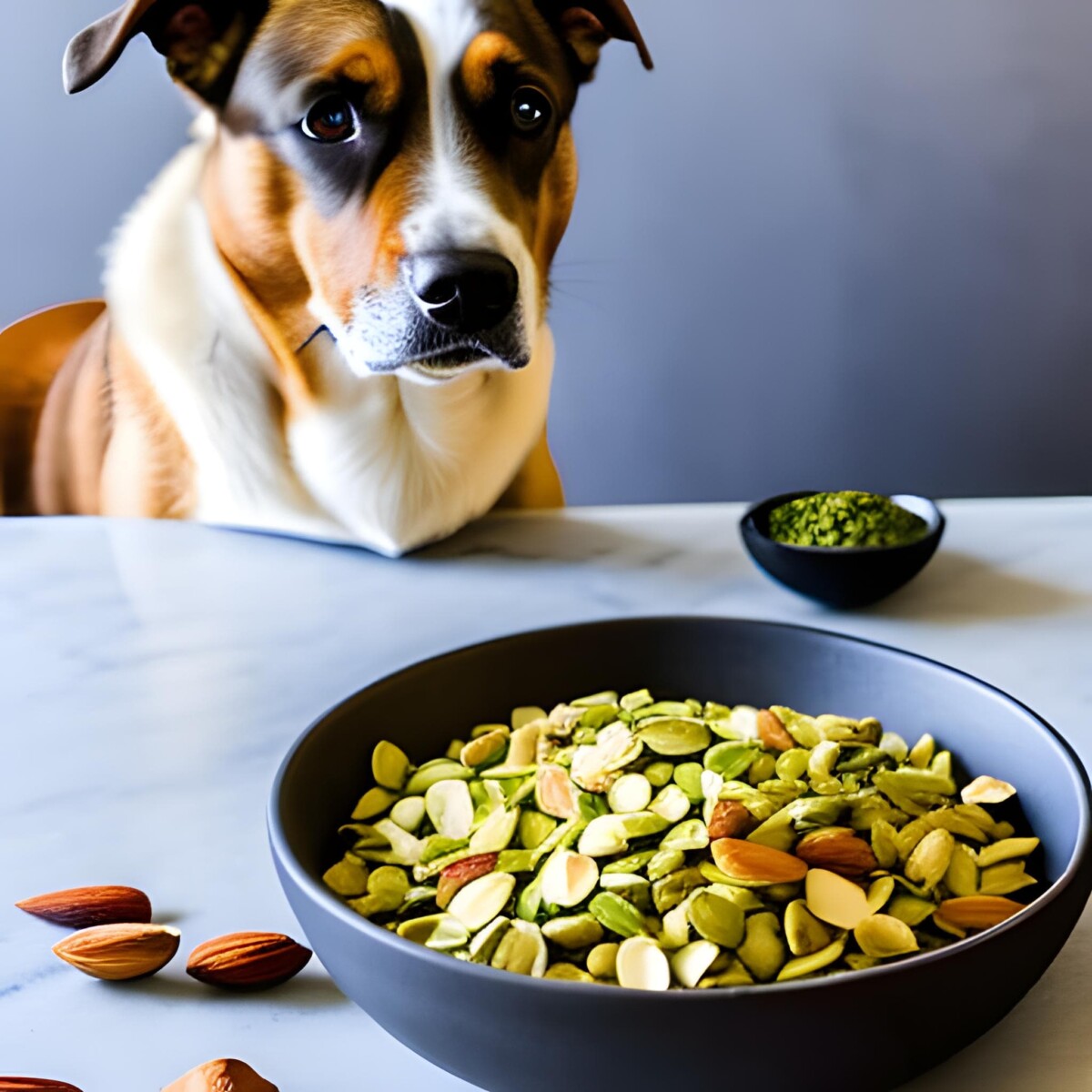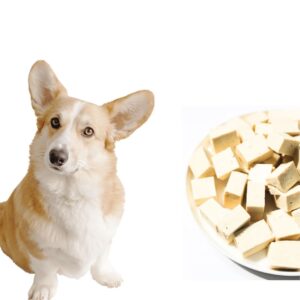Picture this: you’re snacking on a handful of nuts, and your canine friend gazes at you with those adorable eyes, hoping for a taste.
Before you share your snack, you must know which nuts are safe for dogs and which should be avoided.
I will list the good and bad nuts and answer dog parents’ questions.
Let’s get to it 🙂
Can Dogs Eat Nuts
Yes, some nuts are an excellent snack for your dog. Peanuts are at the top of the list of safe nuts.
Can Dogs Eat Nuts: Table of Contents
What Nuts Can Dogs Eat
Peanuts: plain, unshelled peanuts as a safe treat.
Hazelnuts: plain hazelnuts for a nutty indulgence.
Roasted Cashews: plain, shelled, and roasted, avoiding raw ones.
Pine Nuts: in minimal amounts.
Can dogs eat peanut butter?
Peanut butter can be a delightful treat for dogs, but commercial peanut butter brands contain Xylitol, a highly toxic ingredient.
To ensure your pet’s safety, check Ingredients: opt for peanut butter with just one ingredient: peanuts.
Consider making your own peanut butter using a peanut grinder found in the natural foods sections.
Toxic and unsafe nuts for dogs
| Toxic and Unsafe Nuts | Symptoms Of Toxicity |
| Macadamia Nuts | Weakness Inability To Walk Vomiting Tremors Hyperthermia |
| Pistachios | Weakness Inability To Walk Vomiting Tremors Hyperthermia |
| Almonds | Severe Gastrointestinal Upset |
| Brazil Nuts | Pancreatitis |
| Raw Cashews | Weakness Inability To Walk Vomiting Tremors Hyperthermia |
| Walnuts | Gastrointestinal Upset Vomiting Diarrhea |
| Pecans | Gastrointestinal Issues |
| Hickory Nuts | Seizures Neurological Symptoms |
| Black Walnuts | Vomiting Neurologic Symptoms |
Macadamia Nuts
One of the most well-known toxic nuts for dogs is the macadamia nut. Even a small amount of macadamia nuts can lead to adverse reactions. These reactions might include weakness, vomiting, tremors, hyperthermia (elevated body temperature), and depression.
The exact mechanism behind their toxicity remains unclear, but it’s important to recognize that these nuts should never be given to dogs.
Walnuts
Walnuts contain a substance called juglone, which can be toxic to dogs. Ingesting juglone can lead to gastrointestinal upset, including vomiting and diarrhea. Moreover, the high-fat content in walnuts can exacerbate digestive discomfort, making them unsuitable for dogs.
Pecans
Pecans are another type of nut that dogs should avoid. Like walnuts, pecans have a high-fat content that can lead to gastrointestinal issues. Additionally, the toxins present in moldy pecans can potentially harm dogs’ health.
Bitter Almonds
Bitter almonds contain cyanide, a highly toxic compound for humans and animals. Cyanide can interfere with oxygen transportation in the body, leading to severe health issues. While dogs typically avoid bitter almonds due to their bitter taste, it’s best to steer clear of them altogether.
Hickory Nuts
Hickory nuts are not only difficult for dogs to digest but can also contain toxins. The toxins in hickory nuts can lead to gastrointestinal distress and discomfort for your furry friend.
Black Walnuts
Black walnuts contain juglone, similar to regular walnuts, which can harm dogs. Additionally, the shells of black walnuts can cause physical blockages in the digestive tract if ingested.
Acorns
Though not technically nuts, acorns are the fruit of oak trees and can be hazardous to dogs. Acorns contain tannins and other compounds that can cause gastrointestinal upset, including vomiting and diarrhea. In severe cases, ingestion of acorns can lead to kidney damage.
Nutritional Perks of Nuts for Dogs
A Protein Boost: Protein, a crucial nutrient for our pets, can be sourced from nuts. This essential building block supports various bodily functions.
Amino Acids for Circulation: Certain nuts contribute amino acids like arginine, pivotal for producing nitric oxide. Nitric oxide aids in enhancing blood circulation, promoting overall well-being.
Blood Pressure Regulation: Nuts, including peanuts (technically legumes), can play a role in managing high blood pressure, enhancing cardiovascular health in pets.
Fiber for Digestive Health: Nuts provide dietary fiber, combating constipation and fostering a healthy digestive system.
Immune Support from Vitamins: Nuts offer vitamins such as vitamin C, bolstering the immune system and enhancing your pet’s ability to fend off illnesses.
Combatting Fatigue and Stimulating Appetite: Vitamins B1 and B2, present in nuts, can counter fatigue and invigorate your pet’s appetite, contributing to their overall vitality.
Essential Minerals: Nuts pack minerals like potassium, iron, and copper, which are vital for various bodily functions and for maintaining optimal health.
Healthy Fats Source: Nuts serve as a source of beneficial fats, essential for energy and various bodily processes.
Potential Hazards of Nuts for Dogs
As with many things, the coin has two sides. While nuts can offer benefits, there are also potential risks when it comes to incorporating them into your pet’s diet:
Caloric Density Concerns: Nuts are calorie-dense. Overindulgence can contribute to weight gain in your pet, leading to obesity-related health issues.
Fat Content and Pancreatitis: High-fat content in some nuts could trigger pancreatitis if consumed excessively, underscoring the importance of moderation.
Toxicity Issues: Certain nuts are toxic to dogs and cats, necessitating caution and careful selection of safe options.
Choking and Blockage Hazards: Smaller nuts pose choking hazards and could cause blockages in the intestines, making monitoring crucial.
Digestive Discomfort: High fiber content and challenging digestibility might lead to stomach upset, impacting your pet’s comfort.
Coatings and Gastric Irritation: Some nuts come coated with substances like salt, which can lead to gastric irritation and potential harm.
Shell Trauma: Nutshells, if ingested, can cause harm to the gastrointestinal lining, requiring medical attention.
Vet Q$A
Q: Can dogs eat peanuts?
A: Plain, unsalted, and roasted peanuts can be safe for dogs, but watch for allergies and serve in moderation.
Q: Are macadamia nuts really toxic to dogs?
A: Yes, macadamia nuts contain toxic substances to dogs and can lead to adverse reactions.
Q: How do I know if my dog is having a negative reaction to nuts?
A: Watch for symptoms like vomiting, diarrhea, tremors, weakness, or changes in body temperature.
Q: Can dogs eat walnuts?
A: No, it’s not recommended to feed dogs walnuts. Walnuts and other nuts can be toxic to dogs due to their high-fat content and potential to cause gastrointestinal issues.
Walnuts can sometimes contain mold, which is harmful to dogs. If a dog ingests walnuts, it could lead to symptoms like vomiting, diarrhea, abdominal pain, and in severe cases, pancreatitis. If you suspect your dog has ingested walnuts or any other harmful substance, it’s best to contact a veterinarian for guidance. It’s always important to stick to a dog’s regular diet and provide them with safe, dog-friendly treats and foods.
Q: Can Dogs Eat Macadamia Nuts?
A: No, dogs should not eat macadamia nuts. Macadamia nuts are toxic to dogs and can cause symptoms including weakness, vomiting, tremors, increased body temperature, and even paralysis.
The exact mechanism behind the toxicity is not fully understood, but it’s best to err on the side of caution and avoid feeding macadamia nuts to dogs altogether. If a dog accidentally ingests macadamia nuts or shows any signs of illness after consumption, it’s important to seek veterinary care immediately.
Q: Can dogs eat pistachio nuts?
A: It’s generally recommended to avoid feeding pistachio nuts to dogs. While pistachios are not considered as toxic as macadamia nuts, they can still pose a risk to dogs. Pistachios are high in fat and can potentially cause gastrointestinal upset, pancreatitis, and even choking hazards due to their hard shells.
Additionally, the salt content in salted pistachios can harm dogs, as excessive salt intake can lead to salt poisoning. If you want to offer your dog a nutty treat, it’s safer to choose options known to be safe for dogs, such as plain, unsalted, and fully shelled peanuts in moderation. Always consult your veterinarian before introducing new foods into your dog’s diet.
Q: Can dogs eat chestnuts?
A: Chestnuts are not toxic to dogs and can be safe to consume in moderation. However, there are a few important considerations:
Cooked and Unseasoned: If you want to give your dog chestnuts, ensure they are cooked thoroughly and unseasoned. Raw chestnuts can be difficult for dogs to digest and might present a choking hazard. Seasonings and additives, such as salt and spices, should be avoided.
Moderation: While chestnuts are not toxic, they are starchy and can be high in carbohydrates. Feeding too many chestnuts to your dog could lead to gastrointestinal upset or an upset stomach. It’s important to offer them in moderation and as an occasional treat rather than a regular part of their diet.
Allergies: Just like with any new food, there is a possibility that your dog could be allergic to chestnuts. Monitor them closely after consuming chestnuts for any signs of an adverse reaction, such as itching, swelling, or gastrointestinal distress.
Avoid the Shell: Make sure the chestnuts are completely shelled and free from any hard outer layers. The shells can be difficult for dogs to digest and might pose a choking hazard.
Q: Can dogs eat hazelnuts?
A: Hazelnuts are not considered toxic to dogs, but they should be given in moderation and with some precautions:
Unsalted and Unseasoned: If you give your dog hazelnuts, ensure they are plain, unsalted, and unseasoned. Salt and other seasonings can be harmful to dogs in excess.
Moderation: Hazelnuts are high in fat, which can be difficult for dogs to digest in large amounts. Feeding your dog too many hazelnuts could lead to gastrointestinal upset or pancreatitis. Offer hazelnuts as an occasional treat, not a regular part of their diet.
Choking Hazard: Hazelnuts have hard shells that can pose a choking hazard and may be difficult for dogs to digest. Always make sure the hazelnuts are shelled before offering them to your dog.
Allergies: Just like with any new food, there’s a possibility of your dog being allergic to hazelnuts. Watch for any signs of allergic reactions, such as itching, swelling, or gastrointestinal distress, after giving them hazelnuts.
Small Dogs: If you have a small dog, the size of hazelnuts might be a concern. They could have difficulty chewing or swallowing them whole, leading to a choking risk.
Chopping hazelnuts into smaller pieces or choosing smaller nuts might be a safer option.
Q: Can Dogs Eat Brazil Nuts?
A: Brazil nuts are not recommended for dogs. While they are not considered highly toxic, there are a few reasons why they should be avoided:
High Selenium Content: Brazil nuts are known for their high selenium content. While selenium is an essential mineral, consuming too much can lead to selenium toxicity, which can cause symptoms like vomiting, diarrhea, lethargy, and even more severe issues. Dogs have a much lower tolerance for selenium compared to humans.
High-Fat Content: Brazil nuts are also high in fat, which can be difficult for dogs to digest in large quantities. Feeding your dog too many high-fat foods can lead to gastrointestinal upset, pancreatitis, and weight gain.
Choking Hazard: The size and shape of Brazil nuts could pose a choking hazard for dogs, especially smaller breeds.
Potential Allergies: Just like with any new food, there’s a chance that your dog might have an allergic reaction to Brazil nuts.
Q: Can Dogs Eat Cashews Nuts?
A: Cashews are not considered toxic to dogs, but there are some important things to keep in mind before giving them to your furry friend:
Moderation: Cashews are high in fat, and consuming too many can lead to gastrointestinal upset, pancreatitis, and weight gain. Offer cashews to your dog in moderation as an occasional treat rather than a regular part of their diet.
Unsalted and Unseasoned: Always give your dog plain, unsalted, and unseasoned cashews. Salt and other seasonings can be harmful to dogs in excessive amounts.
Choking Hazard: Cashews are relatively large nuts, which might pose a choking risk for smaller dogs. It’s a good idea to chop the cashews into smaller pieces before offering them to your dog, mainly if they’re not accustomed to eating whole nuts.
Allergies: Just like with any new food, there’s a possibility that your dog might be allergic to cashews. Monitor your dog closely for any signs of an allergic reaction after consuming cashews.
Nutritional Balance: Cashews should only be given as an occasional treat and should not replace your dog’s balanced diet.
Q: Can Dogs Eat Pine Nuts?
A: Yes, pine nuts are generally safe for dogs to consume.
Q: Can Dogs Eat Boiled Peanuts?
A: Yes. Boiled peanuts can be safe for dogs to eat in moderation.
Q: Can Dogs Eat Peanuts In The Shell?
A: No, avoid giving any peanuts in shells. They can damage teeth and stomach and can be choking hazards.
Q: Can Dogs Eat Honey Roasted Peanuts?
A: Honey-roasted peanuts are not recommended for dogs. While peanuts themselves are not toxic, the honey-roasting process adds several potential risks:
Sugar and Sweeteners: Honey-roasted peanuts are typically coated in sugar or other sweeteners, which are not suitable for dogs. Introducing sugary foods into a dog’s diet can lead to weight gain and dental problems, potentially contributing to conditions like diabetes.
Artificial Ingredients: Honey-roasted peanuts may contain artificial flavorings, additives, and preservatives, which can harm dogs and cause gastrointestinal upset or allergic reactions.
Salt Content: Honey-roasted peanuts are often salted, and excessive salt intake can lead to sodium toxicity and various health issues in dogs.
My Senior Paws is a participant in the Amazon Services LLC Associates Program, an affiliate advertising program designed to provide a means for sites to earn advertising fees by advertising and linking to Amazon.com. We also participate in other affiliate programs which compensate us for referring traffic.




